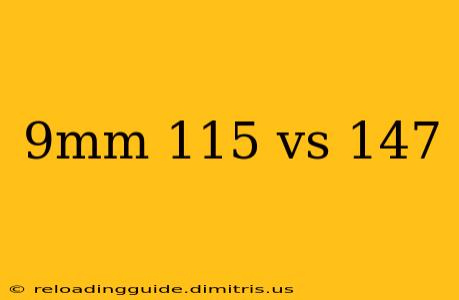Choosing the right ammunition is crucial for any firearm owner, and the debate between 9mm 115gr and 147gr rounds is a common one. Both are popular choices, but their differences in weight significantly impact their ballistic performance and suitability for various applications. This in-depth comparison will clarify the key distinctions and help you make an informed decision based on your specific needs.
Ballistic Differences: Velocity, Energy, and Recoil
The most significant difference between 9mm 115gr and 147gr ammunition lies in their velocity and energy. 115gr rounds generally travel at a much higher velocity, resulting in greater muzzle energy. This translates to a flatter trajectory and potentially more stopping power at longer ranges. However, this higher velocity also leads to more noticeable recoil.
115gr:
- Higher Velocity: Typically exceeding 1100 fps (feet per second).
- Higher Muzzle Energy: More kinetic energy upon impact.
- Flatter Trajectory: Remains on target better at longer ranges.
- Increased Recoil: More noticeable recoil for the shooter.
147gr:
- Lower Velocity: Usually around 950 fps.
- Lower Muzzle Energy: Less kinetic energy compared to 115gr.
- Softer Recoil: Reduced felt recoil, making it more comfortable for practice and extended shooting sessions.
- Subsonic Capabilities: Many 147gr rounds are designed to be subsonic, reducing noise signature. This is especially attractive for suppressed firearms.
Penetration and Expansion
Another crucial factor is how the bullet performs upon impact. While both weights can effectively expand, their behavior can differ. The heavier 147gr bullet tends to exhibit deeper penetration due to its higher mass. Conversely, the lighter 115gr bullet might exhibit greater expansion, leading to a larger wound cavity. However, this isn't a universal truth and depends heavily on the specific bullet design (e.g., jacketed hollow point, full metal jacket).
Practical Applications and Considerations
The best choice between 115gr and 147gr ammunition depends greatly on your intended use:
115gr is generally preferred for:
- Self-defense (some scenarios): The higher velocity and energy can be advantageous in stopping threats quickly.
- Competition shooting (e.g., USPSA): The flatter trajectory aids accuracy at longer ranges.
- Law enforcement (some agencies): Similar to self-defense applications, higher velocity offers potential advantages.
147gr is often favored for:
- Self-defense (some scenarios): Deeper penetration can be beneficial in certain situations, though over-penetration is a potential concern.
- Home defense (some scenarios): Reduced recoil is beneficial in stressful situations.
- Suppressed firearms: The subsonic velocity minimizes the sound signature.
- Target practice: The reduced recoil makes it more comfortable for practice sessions.
Choosing the Right Ammunition: Key Considerations
Beyond weight, consider these factors when selecting 9mm ammunition:
- Bullet design: Jacketed hollow points (JHPs) generally offer better expansion than full metal jackets (FMJs).
- Your firearm: Always consult your firearm's manual for recommended ammunition specifications. Using improper ammunition can damage your firearm.
- Your shooting style and experience: If you're a novice shooter, the reduced recoil of 147gr might be more comfortable.
- Your specific needs: Consider the intended use—self-defense, competition, or target practice—when making your decision.
Conclusion: No Single "Best" Choice
Ultimately, there's no universally superior option between 9mm 115gr and 147gr ammunition. The ideal choice depends on individual preferences, intended use, and firearm characteristics. Thorough research, careful consideration of ballistic characteristics, and testing are essential to determine which ammunition best suits your needs and shooting style. Remember to always prioritize safety and follow safe firearm handling practices.

